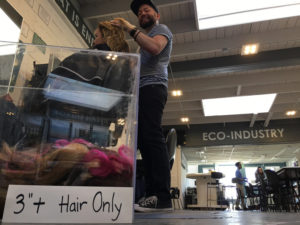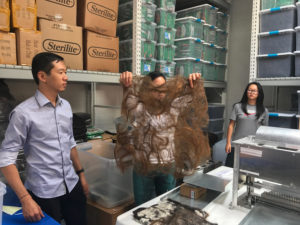A nonprofit has an innovative solution for cleaning up oil spills.
BY SUSANNAH COHEN
 Due to its unique structure, one-pound of hair can soak up one-liter of oil in just one minute. (Art: Hannah E. Buckman)
Due to its unique structure, one-pound of hair can soak up one-liter of oil in just one minute. (Art: Hannah E. Buckman)
Greasy hair, don’t care? Next time you’re agonizing about whether you can eke out your blowout for one more day, think about this. It’s a good thing that your hair attracts oil. It means that one day your hair could help mop up a spill.
Matter of Trust, a nonprofit organization based in San Francisco, Calif., has been utilizing the oil-soaking properties of hair for nearly 20 years. The idea came from Alabama hair stylist and inventor Phil McRory. In 1989, he was washing a client’s hair while watching news coverage of the Exxon Valdez oil spill on television when he had a revelation. Hair attracts oil – that’s why he was washing it. Could it be used to help clean up the ocean?
Ten years later, McRory teamed up with Matter of Trust, which started collecting hair from salons to make into hair mats. The charity has partnered with the New Mexico company FeltCrafts to develop hair-specific felting machines, and now manufactures hair mats at its eco-industrial hub in San Francisco.
A small, grassroots organization, the charity can marshal volunteers nationwide when it needs to. When the container ship Cosco Busan spilled more than 50,000 gallons of oil near San Francisco in 2007, Matter of Trust volunteers were there, working with hundreds of surfers to place mats on the beach to clean up the oil. Three years later, Matter of Trust organized a response to help clean up the BP Deepwater Horizon Gulf Coast spill. This time, volunteers strung hair booms from the piers to soak up the spill and placed them along the beach to protect the white sands. The charity also partnered with teams in Alabama, Florida, and Mississippi to utilize donations of hair and waste fibers that poured in from every zip code in the United States to help with the cause.

At Matter of Trust’s S.F. headquarters, there is also a hair salon called Pitch that donates its scraps to the charity. (Photo: Matter of Trust)
What makes human hair — and animal fur, which Matter of Trust also collects — so effective is its surface area. Hair is adsorbent, not absorbent, which means it can get coated in oil without swelling up like a sponge. In the same way that Norway’s fjords add up to one of the longest coastlines in the world at 63,000 miles, your hair too is full of nooks and crannies thanks to the overlapping cuticles on the outside of the hair shaft. Thanks to its unique structure, one-pound of hair can soak up one-liter of oil in just one minute.
Fleece and feathers also soak up oil extremely quickly, which is why oil spills are so dangerous for wildlife. Birds and mammals have a coarse outer layer and a downy inner layer for warmth, and when the oil reaches the inner layer, they are at risk of hypothermia. And if the cold doesn’t get them, the poison will. When birds and mammals get coated in oil, they start to lick themselves clean, and because their surface area is so large, they ingest correspondingly large amounts of poison.
“Through biomimicry, we have known from observing animals in oil spills that fibers collect oil,” Matter of Trust’s founder and president Lisa Gautier explains. “But now we have scientific studies to back up this information.
A team of researchers from the University of Technology Sydney has been looking at human hair’s effectiveness in cleaning up oil spills. Their study, which will be published later this year, compares the mats with commercial products widely used in Australia.

Turning the hair into a thin textile called a scrim is one of the first steps of the process. (Photo: Matter of Trust)
At Matter of Trust’s eco-industrial hub — a bright, airy space that doubles as an education center and office in downtown San Francisco — staff and volunteers spend their days patiently feeding animal fur and human hair into noisy felting machines. First, they construct a scrim — a gauzy, light textile — from the longer hairs, which have to be at least three inches in length. Then they pass it through the machine again, adding a little more hair as they go. They do this again and again, sprinkling more strands in each time, until the needles have felted it into a sturdy length of fabric.
The hair comes from hair salons and pet groomers from all over the country who have discovered the organization through its press coverage or word-of-mouth from environmentally conscious clients. Individuals are welcome to donate their hair too, and packets of ponytails arrive in the mail every day. Inside Matter of Trust’s San Francisco hub, there is also a hair salon called Pitch that donates its snipped locks to the organization. Their floor sweepings have just a few feet to travel before they’re fed into the felting machines in the back of the space.
Though ocean oil spills usually get the most attention from the media, Matter of Trust is currently focusing on the rather less buzzy issue of storm drains. Fifty percent of oil spills that contaminate waterways in the U.S. come from used motor oil that gets washed into storm drains.
The hair mats act as natural filters, soaking up the oil and trapping any additional debris — like cigarette butts or twigs — in the process. Two cities in Texas, Garland and North Richland Hills, have both installed hair mats in their storm drains, and now even the military is joining in. Matter of Trust is working with scientists and engineers from the Air Force Civil Engineering Center at Tyndall Air Force Base in Florida to explore using human hair and animal fur to soak up contaminants in wastewater. As with the University of Technology Sydney research, this second peer-reviewed paper will add scientific heft to the program. As Gautier says, “It’s helpful when trying to get cities and corporations to use the hair mats.”
But while Matter of Trust is promoting the widespread adoption of hair mats, it has no intention of cornering the market. Rather, the goal is to stimulate the eco economy. The San Francisco hub is a model factory, and the charity is keen to help other cities set up factories of their own.
“We are spending the time and money to gather the information so that it is easy for groups to set up and run small green businesses,” Gautier says. “Our goal is to create a waste-fiber recycling system.”
Until then, the next time you can’t face getting up early to wash your hair, remember to look on the bright side. When you eventually get those greasy locks lopped off, they don’t have to go into landfill. They might, just might, save a puffin one day.
Disclosure: The author of this article used to be a volunteer and consultant for Matter of Trust. Ultimately, she felt it was too good of a story not to share.
Source: https://www.okwhatever.org/topics/can-hair-save-our-oceans
